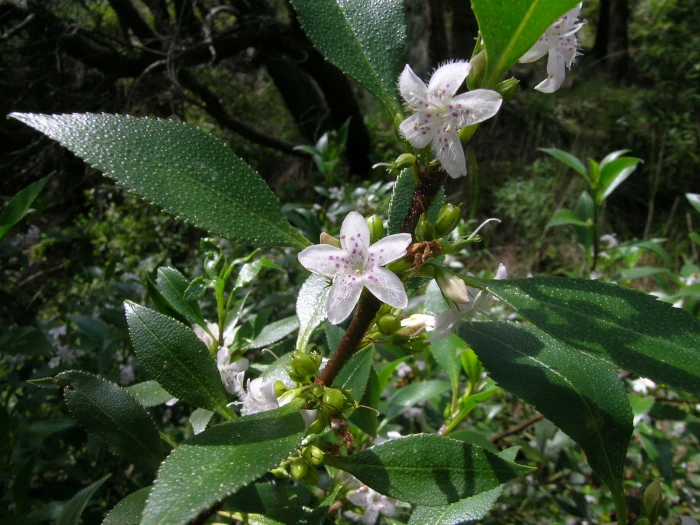Sticky Boobialla
(Myoporum viscosum)
Sticky Boobialla (Myoporum viscosum)
/
/

Harry Rose
CC BY 2.0
Image By:
Harry Rose
Recorded By:
Copyright:
CC BY 2.0
Copyright Notice:
Photo by: Harry Rose | License Type: CC BY 2.0 | License URL: https://creativecommons.org/licenses/by/2.0/ | Uploader: Macleay Grass Man | Publisher: Flickr |









Estimated Native Range
Climate Requirements for Grants Pass, Oregon
| This Plant | Your Site | Plant Suitability for Your Location | ||
|---|---|---|---|---|
| • Precipitation | 12" - 51" | 33" | Your precipitation may be too high for this plant. | Too high |
| • High Temp. | 70°F - 88°F | 90°F | Your summers may be too hot for this plant. | Too hot |
| • Low Temp. | 28°F - 48°F | 33°F | Your winter temperatures are normal for this plant | Excellent |
This plant may not grow well at your location - your precipitation is too high.
Summary
Myoporum viscosum, commonly known as Sticky Boobialla, is an evergreen shrub native to a range of habitats including coastal heath, dry sclerophyll forests, and mallee scrublands in Southern Australia. It can grow up to 2 meters (7 ft) in height and is characterized by young branches that are flattened and sticky to the touch. The plant bears clusters of small, white, star-shaped flowers during the winter and spring months, which are subtly fragrant and attract various pollinators. The leaves can emit an extremely unpleasant smell when crushed.
Sticky Boobialla is valued for its hardiness and adaptability, making it suitable for coastal gardens where it can tolerate salt spray. It is often used as a low screening plant or informal hedge due to its dense growth habit. This shrub thrives in full sun or part shade and prefers soils with medium to fast drainage, requiring low to medium amounts of water once established. It is also notable for its ease of propagation from cuttings. However, gardeners should be aware that the plant may produce an unpleasant odor when the leaves are disturbed.CC BY-SA 4.0
Sticky Boobialla is valued for its hardiness and adaptability, making it suitable for coastal gardens where it can tolerate salt spray. It is often used as a low screening plant or informal hedge due to its dense growth habit. This shrub thrives in full sun or part shade and prefers soils with medium to fast drainage, requiring low to medium amounts of water once established. It is also notable for its ease of propagation from cuttings. However, gardeners should be aware that the plant may produce an unpleasant odor when the leaves are disturbed.CC BY-SA 4.0
Plant Description
- Plant Type: Shrub
- Height: 3-7 feet
- Width: 3-7 feet
- Growth Rate: Moderate
- Flower Color: White
- Flowering Season: Winter, Spring
- Leaf Retention: Evergreen
Growth Requirements
- Sun: Full Sun, Part Shade
- Water: Low, Medium
- Drainage: Medium, Fast
Common Uses
Bee Garden, Butterfly Garden, Deer Resistant, Low Maintenance
Natural Habitat
native to a range of habitats including coastal heath, dry sclerophyll forests, and mallee scrublands in Southern Australia
Other Names
Common Names:
Scientific Names: Myoporum viscosum, Bertolonia glandulosa, Myoporum serratum var. glandulosum, Myoporum tetrandrum var. glandulosum
GBIF Accepted Name: Myoporum viscosum R.Br.